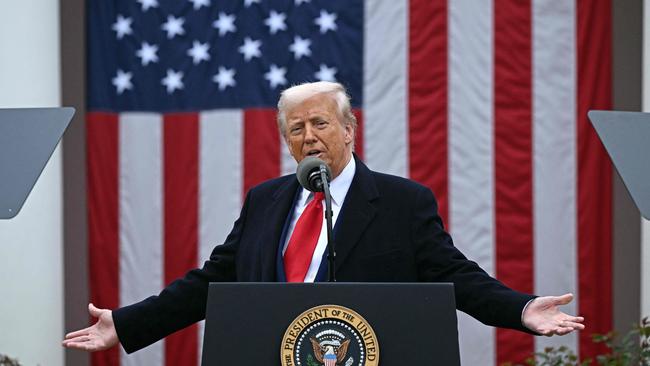Trump’s tariffs could do both Americans and Australians great harm if remaining in place

It is, to begin with, quite wrong to claim, as Creighton does, that the economic cost of the tariffs will be very largely or entirely borne by Americans. That claim would hold were the US what the theory of international trade refers to as a “small country” – that is, a country whose impact on world trade flows is inconsequential. But no one could reasonably believe that the United States, the world’s largest net importer of goods, fits into that category.
It is true that the issue of incidence (ie, who ultimately bears the cost of a tax on imports) can be extremely complex, particularly in markets that don’t meet the textbook criteria of perfect competition.
What can be said, however, is that because of reductions in product variety and losses in economies of scale, the long-term economic costs of tariffs – both to the country that imposes them and to the world as a whole – are likely to be even higher in those markets than they would be in simple, perfectly competitive, markets.
Even putting aside the question of incidence, the macroeconomic linkages between the American economy and those of other countries – linkages Creighton simply ignores – are, in reality, immensely consequential.
Those linkages operate, in the first instance, through the direct effect of American demand for goods and services on the level of economic activity elsewhere. Even if the US avoids recession, a tariff-induced fall in American demand for imports would cut incomes overseas, roiling global economic growth. Should the US go into recession, the downturn in American demand for imports would obviously be even greater, as would be the income falls in other countries, including Australia.
Those direct impacts are compounded by indirect effects through financial markets. Already, the uncertainty that has thrown financial markets into turmoil will increase the cost of capital and reduce investment levels worldwide, adversely affecting productivity and growth.
And if the tariffs induce an acceleration in US inflation, provoking the Federal Reserve into a monetary tightening that raises interest rates and causes further drastic falls in financial markets, the adverse impacts on employment, investment and growth will be greater yet.
As if all that were not enough, Creighton argues that the tariffs are no more than a tax shift, as they generate revenues that can be used to cut income taxes. Assuming that is indeed the administration’s goal (and it seems to have several, not entirely consistent, objectives), it would be difficult, if not impossible, to think of a substantial change in the tax mix that would be more economically harmful.
That isn’t to ignore the very substantial distortions income taxes can cause; but they pale into insignificance compared to those likely to arise from the tariffs Donald Trump has imposed. This is for two reasons.
First, unlike income taxes, which are imposed on an extremely broad and largely inelastic (ie, unresponsive) base, the tariffs fall on a base that is narrow and elastic: they will, in other words, induce responses that both reduce the revenue the tariffs collect and harm productivity, in the US and internationally, as sources of supply that have high costs but have been hit with relatively low tariffs displace lower-cost but high-tariff rivals.
Second, and even worse, the Trump tariffs are light years away from “efficient” tariffs: that is, tariffs whose structure is designed to raise a target amount of revenue at minimum economic cost. Instead, in a pattern that defies economic logic, they include extremely high effective tariff rates on goods used in the production of other goods (that is, intermediate inputs and capital goods), thus taxing US domestic production and so discouraging it.
This tax switch would, for those reasons, reduce American long-term growth, with consequences that would be felt globally – and even more so if the tariff hikes provoke a wave of retaliation worldwide.
Finally, Creighton asks what gives us the right to comment on the US’s choice of economic instruments. The answer is simple.
If the tariffs are merely a bargaining tool, intended to force a general reduction in trade barriers, their not insignificant short-term costs could be offset by longer-term gains – though achieving those gains would require wise leadership, a clear political will and great diplomatic skill.
However, if the tariffs are, as Creighton suggests, intended to remain in place, then they would do both Americans and Australians great harm. Australia and the United States have a shared interest in prosperity. As good friends and close allies, that shared prosperity deserves defending.
Henry Ergas is a columnist for The Australian and Jonathan Pincus is emeritus professor of economics at the University of Adelaide and former principal economic advisor to the Productivity Commission.


Writing on these pages Adam Creighton, in an attempt to minimise the impact of the Trump tariffs, advances a number of propositions that are highly questionable at best, plainly incorrect at worst.